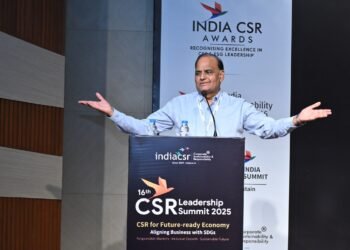
Words Rusen Kumar
Dr Wayne Visser, Founder and Director of CSR International and thinker and writer is on a 20 Country CSR Quest’ World Tour, CSR quest to talk and learn about how companies can help tackle the world’s most pressing social and environmental problems. Dr. Visser is in India from 18th to 28th April during tour.
During India tour Dr. Wayne is addressing CSR Symposium, Training Programme and Workshops in various cities Delhi, Chennai, Mumbai, Raipur and sharing experience on CSR. On April 18, 2010 Dr. Wayne came to Raipur (Chhattisgarh) and addressed a CSR symposium, organized by CII and INDIACSR Dr. Visser claimed that despite its seemingly impressive steady march of progress in the past decades, Corporate Social Responsibility (CSR) has failed. Furthermore, we are witnessing the decline of CSR, which will continue until its natural death, unless it is reborn and rejuvenated.
In an exclusive interview with Rusen Kumar, Editor, India CSR: Dr. Wayne Visser shares his view on CSR and CSR Quest World Tour. Edited excerpt:
Please explain your CSR Quest’ World Tour, what is the objective?
I am travelling to around 20 countries to collect and share innovations, best practices and lessons in CSR, which I am posting online in video, audio and written weblogs.
Why do you feel such a tour is required?
First, because I believe CSR in the West has failed and developing countries need to avoid repeating their mistakes. Second, because many companies in developing countries still have a very limited philanthropy- or PR-driven view of CSR, which I am trying to change into a more strategic and embedded CSR.
And third, because I believe many of the innovations and creative solutions to social, environmental and ethical problems are to be found in developing countries and need to be captured, scaled and shared with the world.
Which countries you are traveling to and which are some major and not so major organizations where you delivering sessions?
The countries cover Africa, the Middle East, Eastern Europe, Australia, Asia, South America, Central America and North America.
There are many organisations that are hosting or sponsoring the workshops and courses, from industry associations (like Confederation of Indian Industry (CII) and NASSCOM Foundation in India) to educational institutions (like Delhi University, Indian Institute of Foreign Trade (IIFT) and Business and Community Foundation (BCF), Institute for Financial Management and Research (IFMR) and Genteel School of Business and Economics).
Why did you choose India in your quest tour?
India many good examples of CSR traditions that the world can learn from, like Tata’s trusteeship model and various ICT social solutions such as text services (on prices, weather and policies) for rural farmers. In addition, it is a country where, unless a different growth and consumption model is adopted, the country and the world’s ecological sustainability and social equity will be threatened.
Why do you think the topics of CSR and Sustainability gaining so much attention globally?
It is a combination of need (with most of the social, environmental and ethical problems still getting worse, not better), awareness (fuelled by a more globalised and connected world) and opportunity (with responsible and clean tech markets estimated to be worth US$ 750 billion by 2050).
Please explain CSR 1.0 and CSR 2.0 and the differences.
CSR 1.0 is the approach to CSR over the past 50 years in the West, in which philanthropic- and PR-based CSR remains incremental, peripheral and uneconomic.
By contrast, CSR 2.0 is based on the principles of creativity (including product innovation and social entrepreneurship), scalability (including bottom of the pyramid markets and choice editing by retailers like Wal-Mart), responsiveness (including stakeholder involvement and lobbying for higher standards), glocality (meaning adopting global principles with local adaptation on CSR) and circularity (moving from end-of-pipe to cradle-to-cradle or zero-waste design for production and services).
Please share your thoughts on spread, adoption and practices of CSR in India.
By and large, India still seems to be at the CSR 1.0 stage (philanthropy and PR focused), although movement to CSR 2.0 is starting to happen. Compared with BRICS countries, research suggests India lags behind South Africa and Brazil and is ahead of Russia and China on CSR. In Asia, for example on CSR reporting, India is ahead of all countries except Japan. Karmayog’s 2009 CSR ratings show that while more companies are disclosing CSR information every year, most still remain at a superficial or immature stage and 25% of the largest 500 companies still disclosure nothing on CSR.
How do you think can CSR be made more widespread and relevent in Indian companies?
This will be a combination of government incentives (for example, if they include CSR disclosure requirements in their corporate governance guidelines), supply chain pressure (where global companies will demand higher social and environmental standards) and NGO activism. In terms of the government role, although the draft CSR guidelines are to be commended and the 2% requirement for public company expenditure on CSR, there is a danger that it is sending the wrong message, i.e. simply reinforcing the philanthropic/PR approach to CSR, rather than creating policies that encourage strategic CSR, which is more about accountability for the impacts of the companies’ operations, products and services.
What are your plans beyond CSR Quest World Tour?
The think-tank organisation that I run, CSR International, is moving towards the provision of CSR e-learning and providing an international institute for CSR professionals. We will also be piloting an international CSR Perceptions Index in 2011.
What do you feel has driven the increased C-level focus on CSR initiatives in today’s business world?
Apart from the drivers mentioned above, the catastrophic consequences of irresponsible behaviour (e.g. Enron and Lehman Brothers), the scale of potential liabilities (e.g. Exxon has paid around US$8 billion as a result of the Valdez spill) and the size of opportunities (responsible and sustainable markets are estimated to be worth $750 billion by 2050).
About the Author
Rusen Kumar is globally renowned journalist writing on CSR issues.
You may also like:
- We will offer what a knowledge society needs: Rajendra Pawar, Founder of NIIT University
- Revolutionizing healthcare in rural India: Huzaifa Khorakiwala, CEO, Wockhardt Foundation
- Auro University is a CSR contribution to education of JHM Hotels: Dr Rana
- I have a dream to train one lakh youngsters every year in vocational training: Naveen Jindal
- ‘Sustainability’s a difficult subject, beyond just CSR’





















